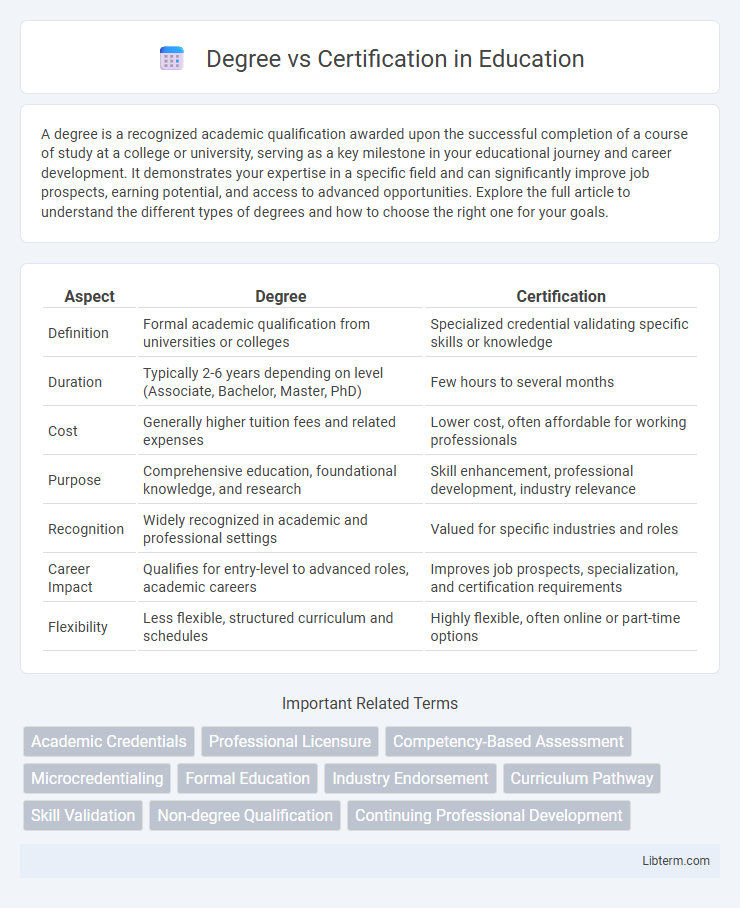A degree is a recognized academic qualification awarded upon the successful completion of a course of study at a college or university, serving as a key milestone in your educational journey and career development. It demonstrates your expertise in a specific field and can significantly improve job prospects, earning potential, and access to advanced opportunities. Explore the full article to understand the different types of degrees and how to choose the right one for your goals.
Table of Comparison
| Aspect | Degree | Certification |
|---|---|---|
| Definition | Formal academic qualification from universities or colleges | Specialized credential validating specific skills or knowledge |
| Duration | Typically 2-6 years depending on level (Associate, Bachelor, Master, PhD) | Few hours to several months |
| Cost | Generally higher tuition fees and related expenses | Lower cost, often affordable for working professionals |
| Purpose | Comprehensive education, foundational knowledge, and research | Skill enhancement, professional development, industry relevance |
| Recognition | Widely recognized in academic and professional settings | Valued for specific industries and roles |
| Career Impact | Qualifies for entry-level to advanced roles, academic careers | Improves job prospects, specialization, and certification requirements |
| Flexibility | Less flexible, structured curriculum and schedules | Highly flexible, often online or part-time options |
Understanding the Difference: Degree vs Certification
A degree represents a comprehensive academic achievement awarded by colleges or universities after completing a structured curriculum, typically spanning several years and covering broad theoretical knowledge. Certifications are specialized credentials obtained by demonstrating proficiency in specific skills or technologies, often through shorter, targeted courses and exams. Understanding the difference between a degree and certification helps professionals select the right credential for career advancement or skill development based on their goals and industry requirements.
Key Benefits of Earning a Degree
Earning a degree provides comprehensive knowledge and critical thinking skills essential for long-term career growth and higher earning potential. It offers access to a broader range of job opportunities and positions of leadership that often require formal academic credentials. Degrees from accredited institutions also establish credibility and professional recognition in various industries.
Advantages of Professional Certifications
Professional certifications offer targeted skill validation and industry recognition that can enhance career advancement opportunities and salary potential. They are often more cost-effective and quicker to obtain than traditional degrees, allowing professionals to stay current with evolving technologies and standards. Certifications demonstrate a commitment to continuous learning and specialized expertise valued by employers across various fields such as IT, healthcare, and project management.
Career Opportunities: Degree Holders vs Certified Professionals
Degree holders often access broader career opportunities in industries requiring comprehensive knowledge and advanced qualifications, such as engineering, medicine, and law. Certified professionals typically excel in specialized fields like IT, project management, and cybersecurity, where specific skill validation accelerates job placement. Employers value degrees for foundational expertise and certifications for up-to-date proficiency, making the combined credentials highly competitive in the job market.
Duration and Cost Comparison
Degree programs typically require two to four years of full-time study, with costs ranging from $20,000 to over $100,000 depending on the institution and program. Certifications often take a few weeks to several months to complete and generally cost between $200 and $2,000, making them a more affordable and faster option. While degrees provide comprehensive education and broader career opportunities, certifications offer specialized skills with quicker entry into the workforce at a lower financial investment.
Industry Preferences: What Employers Want
Employers in technology and creative industries often prefer certifications for their demonstration of up-to-date skills and practical expertise. In contrast, sectors like healthcare, engineering, and academia typically prioritize degrees for their comprehensive education and theoretical foundation. Many companies value a combination of both qualifications to ensure candidates possess both foundational knowledge and specialized skills.
Flexibility and Learning Formats
Degrees offer structured, long-term programs with limited flexibility in course schedules, while certifications provide shorter, targeted training that can often be completed online or through self-paced formats. Certifications accommodate diverse learning preferences, including asynchronous classes, workshops, and bootcamps, enhancing accessibility for working professionals. This flexibility enables learners to quickly acquire specific skills and adapt to changing industry demands.
Skills Acquired: Deep Learning vs Specialized Training
Degrees in deep learning provide comprehensive knowledge in neural networks, algorithms, and mathematical foundations, equipping students with strong theoretical and practical skills for advanced AI research and development. Certifications focus on specialized training in specific tools, frameworks, and applications like TensorFlow or PyTorch, enabling professionals to quickly acquire targeted skills for industry use. While degrees foster a broad understanding and problem-solving ability, certifications deliver concise, hands-on expertise tailored to immediate job roles.
Which is Right for You? Factors to Consider
Choosing between a degree and certification depends on career goals, industry requirements, and time commitment. Degrees offer comprehensive knowledge and broader career opportunities, while certifications provide specialized skills and faster entry into the workforce. Evaluate job market demands, your current experience level, and learning preferences to determine the best fit for your professional growth.
Combining Degrees and Certifications for Career Growth
Combining degrees and certifications creates a powerful synergy that enhances career growth by blending comprehensive academic knowledge with specialized, industry-recognized skills. Degrees provide a strong theoretical foundation and critical thinking abilities, while certifications validate practical expertise and current proficiency in specific tools or methodologies. This combination increases employability, opens doors to advanced positions, and demonstrates commitment to continuous professional development in competitive job markets.
Degree Infographic

 libterm.com
libterm.com